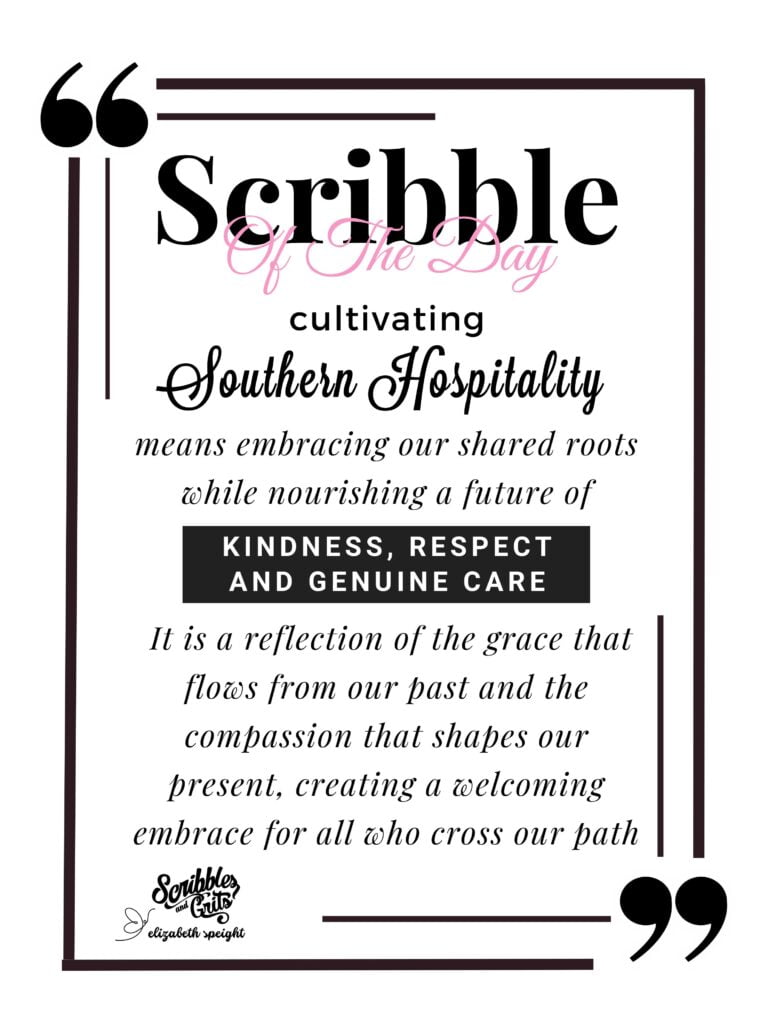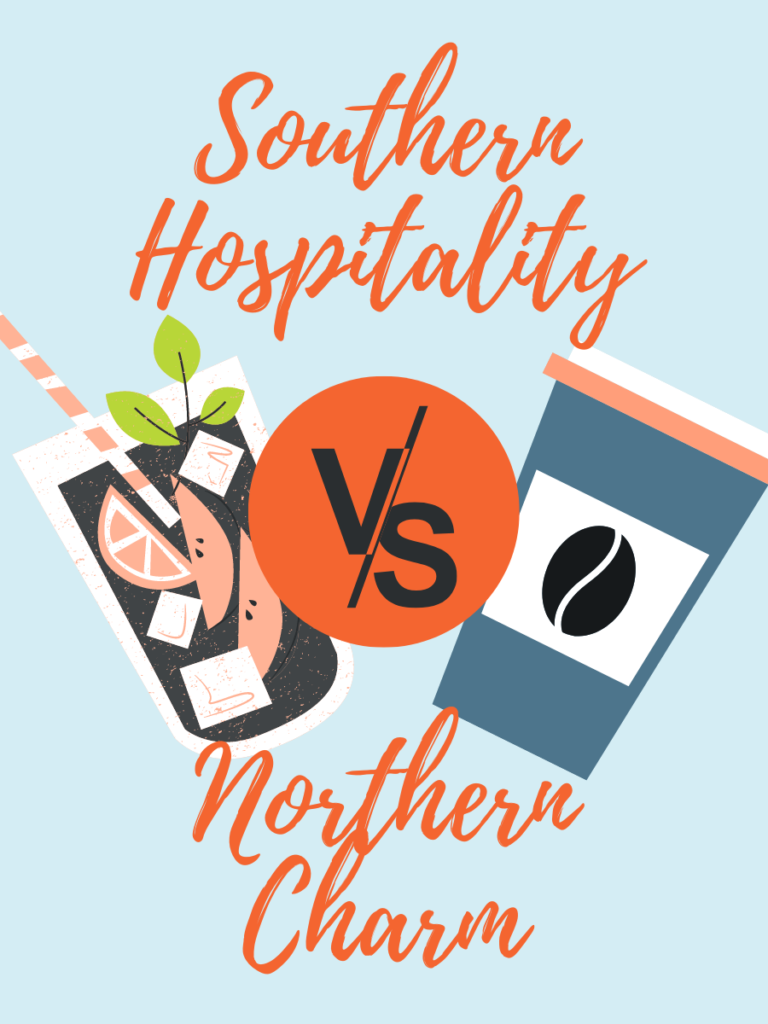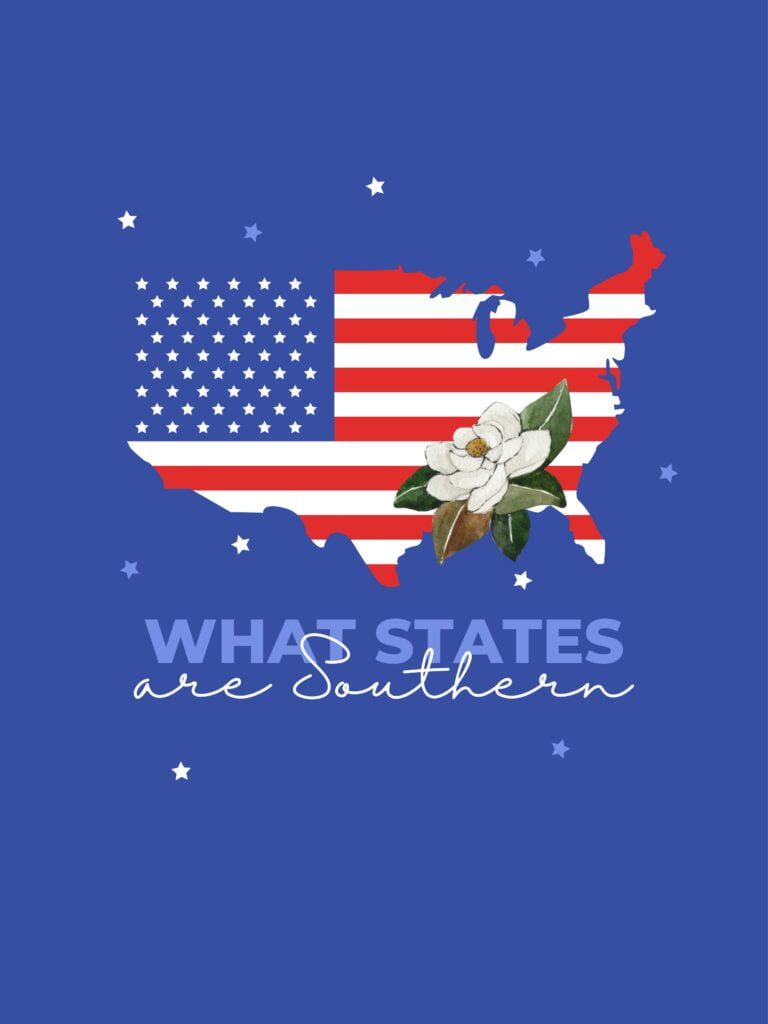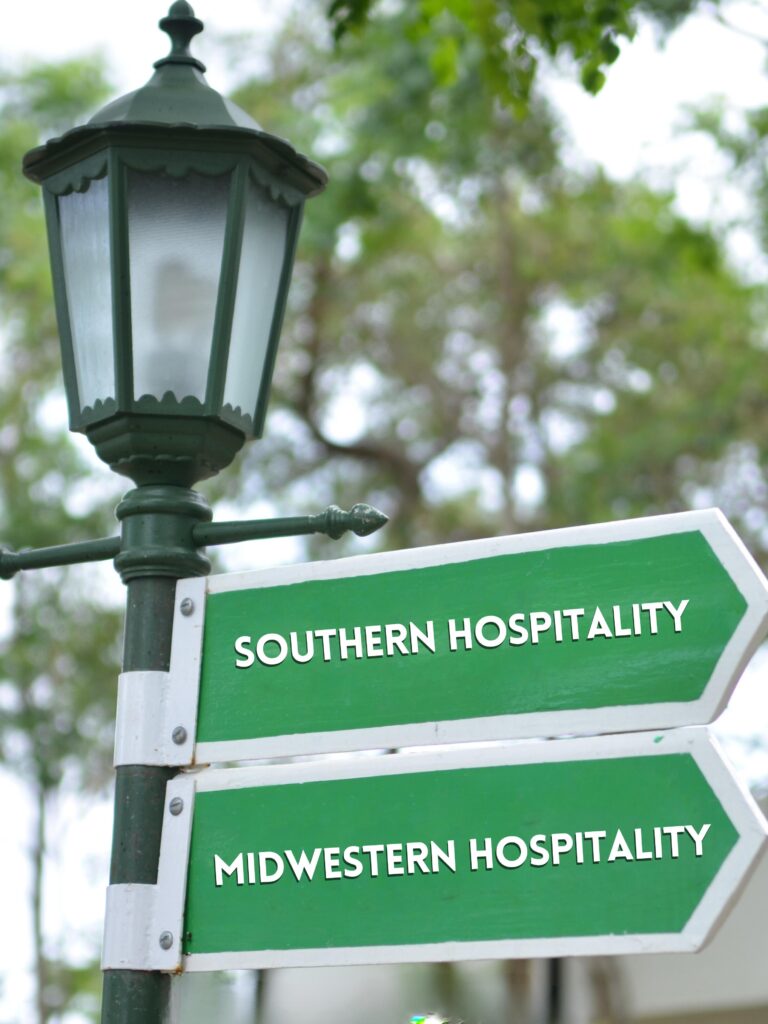What is American Southern Hospitality? A Comprehensive Exploration
As a lifelong Southerner, I can assure you, ‘Is there such a thing as Southern hospitality?‘ isn’t just a question—it’s the essence of my upbringing. Far from being a mere saying, it’s a way of life woven into the fabric of our communities. Kindness and helpfulness are norms, and food serves as a heartfelt welcome. (As a testament to this culture, my hometown of Charleston has been honored as the ‘World’s Friendliest City‘ and ‘World’s Best City To Visit‘ countless times.)
But answering the question, ‘What is American Southern Hospitality?‘ requires grappling with complex realities of history. This exploration only scratches the surface of a profound cultural tradition with deep and intricate roots.

The Pineapple is a classic symbol of American Southern Hospitality
What Is American Southern Hospitality
American Southern Hospitality is a cultural tradition in the Southern United States, characterized by a genuine warmth, kindness, and welcoming attitude towards visitors and community members alike. It’s more than just a stereotype; it’s a way of life where people strive to treat others in the most welcoming manner possible. Here are some qualities that define Southern hospitality:
- Politeness: Southerners are known for their manners and politeness, which includes saying “please” and “thank you” and using titles like “ma’am” and “sir” as a sign of respect.
- Good home cooking: Southern hospitality often involves offering guests food and drink, especially homemade dishes that are a staple of Southern cuisine.
- Kindness: Southerners are known for their friendly and welcoming nature, and they often go out of their way to make visitors feel comfortable and at home.
- Helpfulness: Southerners are often willing to lend a hand to those in need, whether offering directions or helping with a task.
- Charm: Southerners are known for their charm and hospitality, which can make visitors feel special and appreciated.
- Charity: Southerners often give back to their communities through charitable acts, such as volunteering or donating to local causes.
A HEARTFELT NOTE
From Me
As you journey with me through this article, please know that I’ve done my best to provide thorough research from reputable sources, presenting what most historians agree is true. For those wishing to delve deeper, these links are a starting point to explore this complex subject matter.
I want you to know that this exploration through the Historical Roots of Southern hospitality has also been a learning journey for me. When I started “Scribbles and Grits,” it was to understand a culture I love, and I’ve found it both beautiful and heart-wrenching.
I wish the hospitality I hold dear were rooted in love from the start, but it was not. With that sad truth, let’s nevertheless uncover the layers of this rich history together with open hearts and curious minds.
Historical Roots
Origin
The precise origins of the term “Southern hospitality” are somewhat contested. Some accounts credit a journalist for coining the term during his southern travels in the early 1800s.
In 1835, Jacob Abbott chronicled his journeys across the South, detailing numerous interactions with individuals who went above and beyond to make him feel welcome. Abbott is widely recognized for originating the term “Southern Hospitality.”
Other sources suggest that the term emerged between the 1820s and 1830s amid intensified national debates over slavery.
Despite this discrepancy in pinpointing the term’s first use, historians agree that the practice of American Southern hospitality finds its roots in the social customs of affluent planters in various Southern colonies during the 1600s and 1700s.
These customs were deeply entwined with slavery in the United States. The arduous labor performed by enslaved individuals made it possible for Southern planters to entertain their guests luxuriously and with apparent ease.
Plantation Era
American Southern Hospitality took root among the antebellum planter classes to reinforce their social standing.
Being situated atop the social ladder, the affluent planters used hospitality to cement their status. They generously welcomed neighbors and visitors, building a reputation of graciousness and generosity.
During this period, hospitality served as a mirror reflecting the wealth and social rank of the host.
Large plantations, besides being centers of agricultural production, functioned as social hubs. These estates were venues for dinners, dances, and grand social events, organized to showcase the host’s generosity and prosperity.
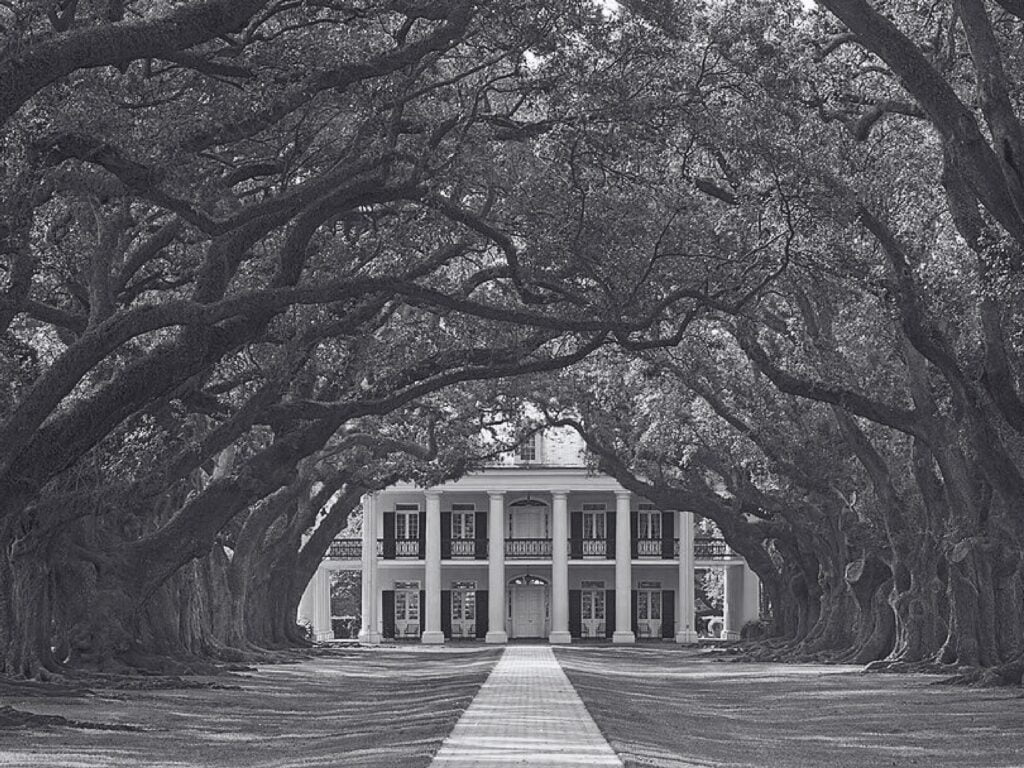
Oak Alley Plantation relied heavily on enslaved labor for its operation. Today, the site includes exhibits about the lives of the people who were enslaved there.
CREDIT: Emily Richardson, CC BY-SA 3.0, via Wikimedia Commons
Enslaved individuals were silent yet indispensable contributors to maintaining this high level of hospitality. They were entrusted with various tasks, from meal preparations to guest care and even providing various forms of entertainment.
Amidst the turbulence of the 1830s, the term “Southern hospitality” found its voice. This period was punctuated by growing sectional tension beginning to shape American culture.
Visiting neighbors was more than a brief encounter – it was a significant, time-consuming event. The ritual of preparing food, offered as a gift to the host, was considered a meaningful ceremony.
This display of generous hospitality brought a sense of community and comfort, helping to counter the isolation inherent in rural farm life, further solidifying the tradition within the Southern culture.
Civil War
Southern hospitality demonstrated its resilience and adaptability during the Civil War, undergoing several changes:
- Reframing the Narrative: Before the Civil War, Southern hospitality was highlighted as evidence of the generosity of the Southern aristocracy, which often eclipsed the grim realities of slavery. However, during the war, “Southern hospitality” took on a defensive tone to justify the Southern lifestyle and its politically entrenched dependence on slavery.
- Hosting Travelers: The tradition of Southern hospitality did not falter during the Civil War. It was common for travelers, including Confederate soldiers, to be welcomed into private homes due to a shortage of inns and boarding houses. This extension of hospitality was particularly essential during a time of resource scarcity.
- Impacts on Immigrants: The war changed the South’s hospitality towards immigrants. While Southern hospitality once extended to strangers – with the expectation that anyone could approach a plantation and be invited in as a guest – the hospitality shown towards immigrants waned during the war. Instead, The focus shifted to the war effort and preserving the Southern way of life.
- Preservation of Traditions: Southern hospitality’s customs and traditions persisted despite the war’s hardships. Neighborly visits and food preparation as a host’s gift remained significant aspects of Southern hospitality. Treating guests as family and upholding good manners continued to be valued.
Despite the societal upheaval brought about by the Civil War, including the abolition of slavery and dissolution of the plantation system, the core principles of Southern Hospitality persisted, navigating the changes and adapting to new social landscapes.
The practice evolved during this transformative period, transitioning from representing wealth and social status to embodying warmth, kindness, and generosity.
This marked a significant shift as it expanded its reach to include individuals beyond the traditional “planter” class, such as African-Americans.
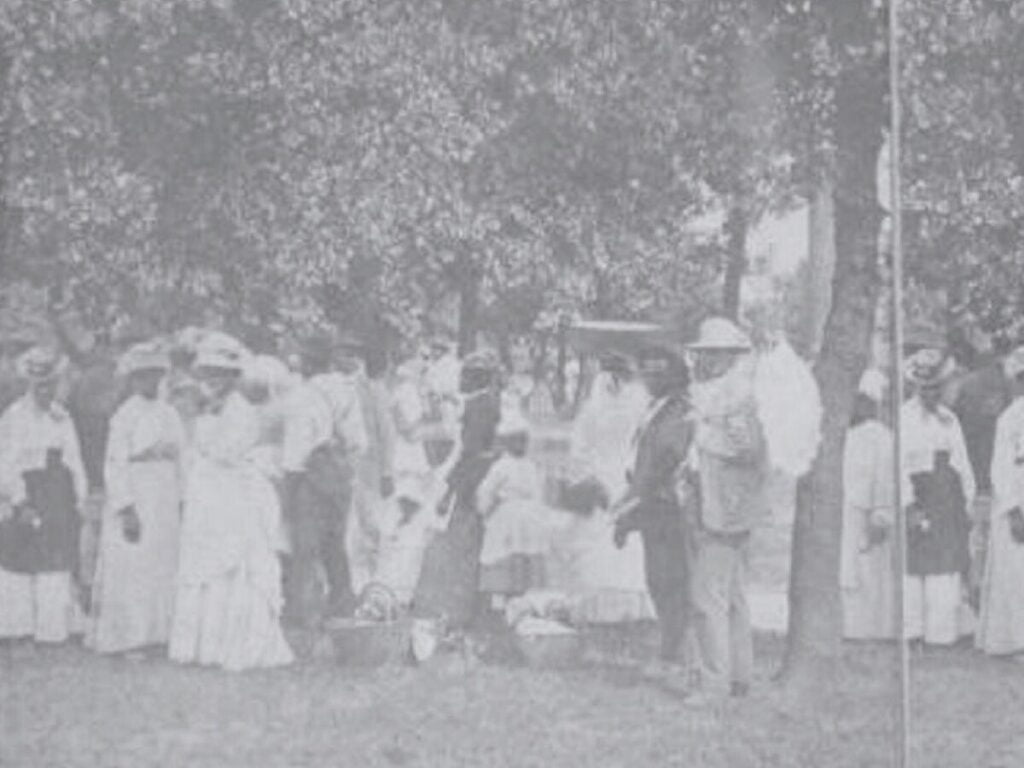
A testament to the evolving social landscape of the time, this image captures a moment of unity as African Americans and Whites come together to celebrate Independence Day. Despite the era’s challenges, such gatherings hint at the potential for inclusivity and shared patriotism in the post-Civil War period. CREDIT: New York Public Library, Public domain, via Wikimedia Commons
Interestingly, the concepts of Southern hospitality were utilized in promotional materials to attract African-American visitors to Southern destinations.
Religion played a crucial role in this evolution, with the South’s religious convictions echoing in the practice of hospitality. As noted by travel writer Ernest Hamlin Abbott, kindness to strangers, reminiscent of the Good Samaritan story, held as much importance as religious ceremonies.
In today’s times, the enduring traits of Southern Hospitality – warmth and generosity – along with gradual and ongoing efforts towards greater inclusivity continue to be a significant part of the region’s culture, showing the lasting influence of this tradition.
Even as challenges remain, the South’s compassion and community spirit persists.
Traditional Southern Manners and Etiquette
Southern hospitality has long been grounded in the region’s intricate social codes and mannerisms. These codes have evolved over time, reflecting the diverse and complex history of the South.
Antebellum Etiquette and Plantation Culture
Historians have analyzed how strict standards of etiquette emerged under the plantation culture of the antebellum South. Here, concepts of duty, honor, and propriety upheld certain societal norms.
1. Codes of Obedience and Courtesy
In this refined society, codes of obedience and courtesy held great significance, particularly among slaves and servants. Woven into the fabric of daily life, these codes underscored hierarchical relationships and guided interactions among individuals.
2. Chivalry, Family Honor, and Respectability
Central to traditional etiquette norms were chivalry, family honor, and respectability. Southern gentlemen exemplified gallantry and courage, upholding the values of honor and dignity. Meanwhile, young Southern women were gracefully groomed to embody virtues of piety, purity, and domesticity, reflecting the nurturing heart of the family.
3. Rigid Color Lines and Social Manners
Throughout the region, rigid color lines permeated social manners, impacting hospitality and guest reception. These lines served as a reminder of the challenges those advocating for equality and inclusivity face.
African-American Communities and the Assertion of Dignity
In the wake of the harsh realities of slavery, African-American communities began to carve out unique standards of etiquette and decorum. These standards were not merely about conforming but were a powerful assertion of dignity, self-respect, and moral authority.
- Black women embraced values such as piety, temperance, and educational advancement, cultivating self-respect within their communities.
- In their unwavering determination, African Americans sought to assert their dignity by expressing self-worth through their speech, appearance, and conduct, showcasing resilience and strength.
According to author Evelyn Brooks Higginbotham, in her book ‘Righteous Discontent: The Women’s Movement in the Black Baptist Church, 1880-1920,’ churches often served as the epicenters of these efforts. They emphasized modesty and discernment, provided a moral compass, and reinforced values of self-respect within the community.
Politeness and Respect
Southern hospitality’s heart lies in a deep-seated tradition of politeness and respect.
Simple courtesies, such as saying “please” and “thank you,” are not just expected but are seen as a reflection of one’s character. Often taught from a young age, these phrases are more than words; they demonstrate appreciation and respect for others.
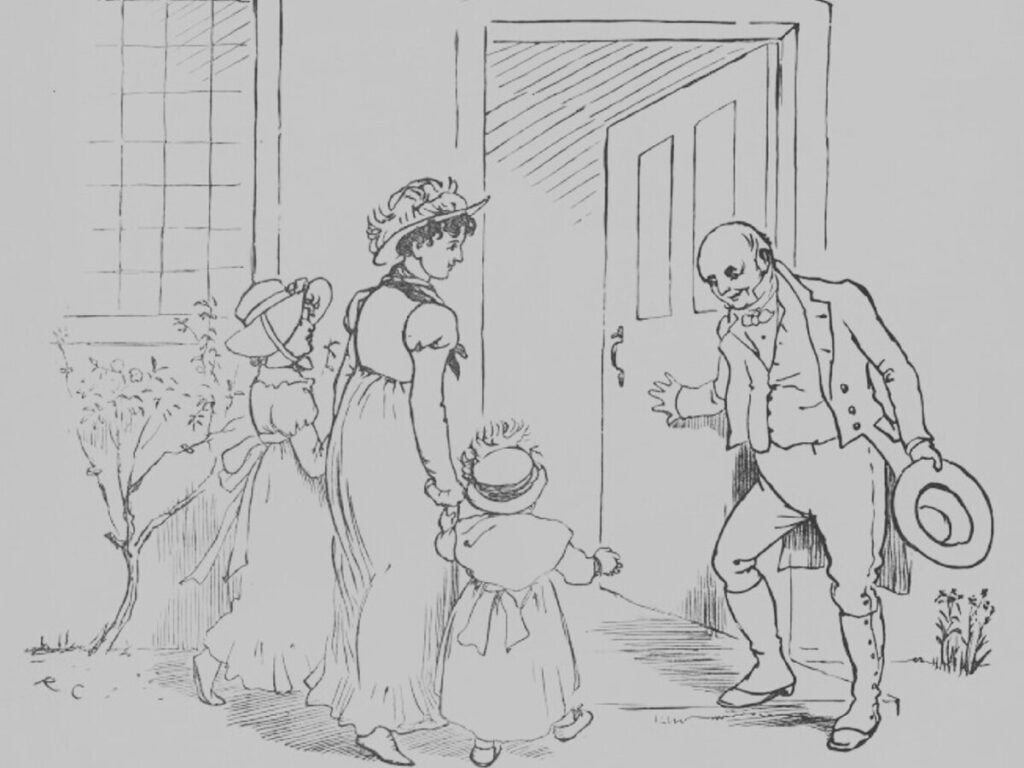
A gentleman exhibits classic Southern manners by opening doors for a lady and her daughters. CREDIT: Open Edition Journals
Social gatherings in the South are often a showcase of these manners. Mindfulness of one’s behavior, from conversing to eating, is of utmost importance.
Proper table manners are highly valued, with practices like chewing with a closed mouth and refraining from talking with a full mouth being standard expectations.
The Southern tradition of addressing others by their proper titles is another distinctive aspect of this culture of respect. Terms like “ma’am” or “sir” are not just formalities but are seen as a sign of respect and acknowledgment of the other person.
The Southern emphasis on politeness and respect is not just about following rules. It’s about fostering a sense of community, showing regard for others, and maintaining a culture that values every individual’s dignity.
Conversation
Engaging in conversation is an important part of Southern hospitality. Southerners are known for their ability to make small talk with almost anyone, including strangers.
It is considered impolite not to acknowledge others when passing by, even if it is just with a smile and a polite nod.
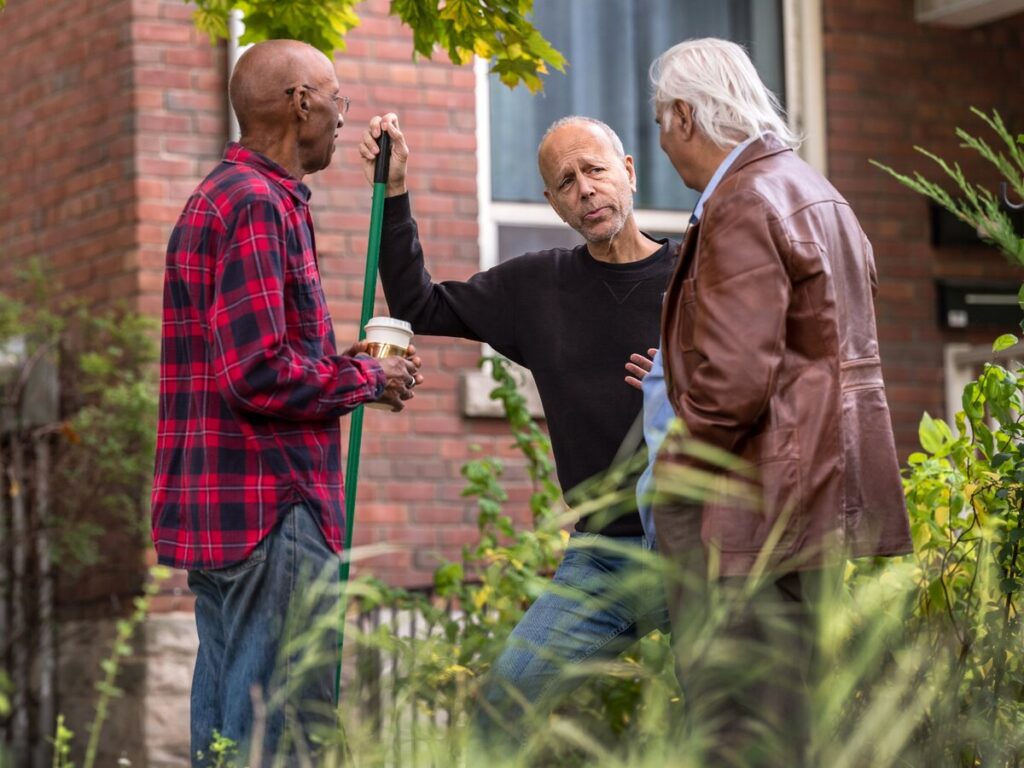
Three neighbors sharing friendly conversation, with the camaraderie extending from yard work to a simple cup of coffee
Neighbors often engage in friendly conversations, and while gossip is typically frowned upon, it certainly does happen – ( just as it does everywhere else – ha! ). This, after all, is a common trait found across most cultures.
Instead, it’s considered “proper” to avoid discussing sensitive topics during social gatherings, focusing on finding common ground to maintain a light and enjoyable atmosphere.
Helpfulness and Charity
Offering help and showing charity towards others is another defining aspect of Southern hospitality.
People in the American South pride themselves on being good neighbors and are often willing to lend a helping hand in times of need.

A kind neighbor lends a helping hand by bringing groceries to an elderly resident, encapsulating the region’s spirit of care and community.
It’s common for individuals to offer assistance with things like grocery shopping or home repairs, even if they have yet to be asked.
This genuine concern for others creates a tightly-knit community where everyone is willing to support one another.
In conclusion, traditional Southern manners and etiquette focus on treating others with respect, engaging in polite conversation, and being charitable towards one’s neighbors.
By incorporating these values into daily interactions, Southern hospitality thrives as a unique aspect of American culture.
Southern Hospitality in Social Contexts
Many often wonder which states make up the ‘Southern’ United States. The answer isn’t as straightforward as it might seem, as the territories that comprised the Confederate States during the Civil War aren’t precisely identical to those often labeled as the South in contemporary discussions.
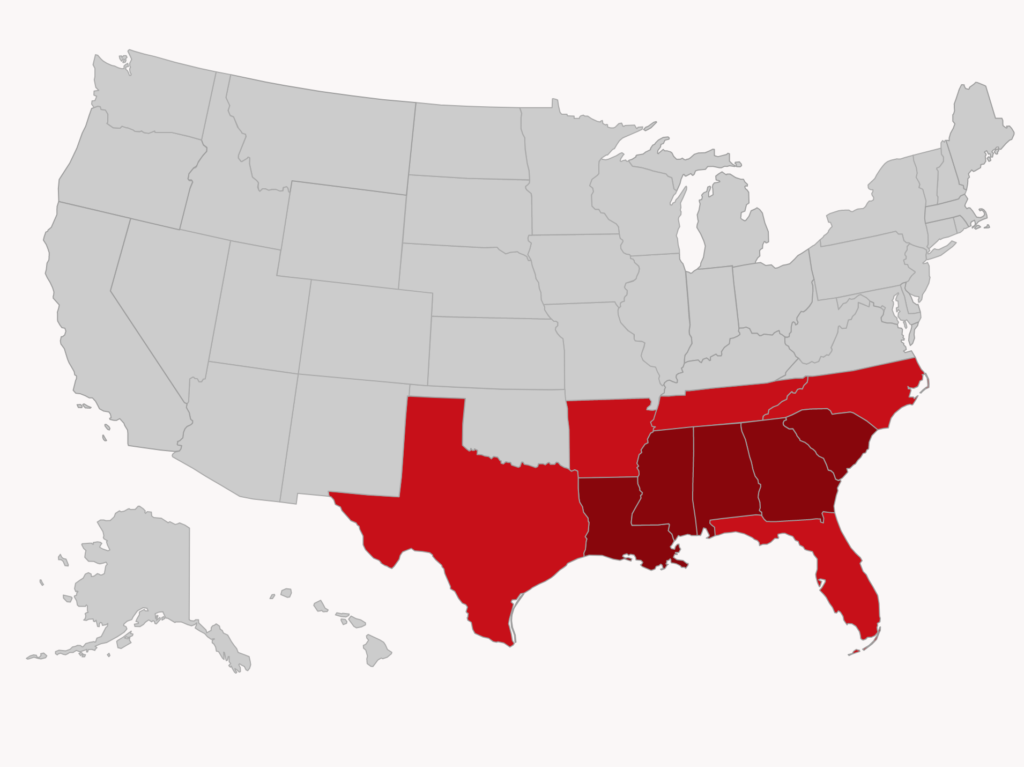
with ‘The South,’ encompassing ‘The Deep South’ in dark red.
CREDIT: LZhang25, CC BY-SA 4.0, via Wikimedia Commons
Here’s a quick glance at the distinctions of the states:
- Confederate States during the Civil War: Comprised initially of seven slaveholding states of the Deep South, with four more joining later. Kentucky and Missouri were claimed but stayed with the Union.
- Modern-day States generally regarded as the South: This includes 16 states identified by the United States Census Bureau, encompassing the states of the Confederacy and others such as Maryland, Delaware, and West Virginia.
To conclude, the definition of the Southern United States has evolved over time, and modern interpretation can fluctuate based on context. It typically consists of the Confederate states and others with strong cultural connections to the South.
Guests and Strangers
In the Southern United States, it is common for strangers to be treated with the same level of warmth and kindness as long-time acquaintances.

A neighbor welcomes newcomers to the neighborhood warmly, demonstrating the enduring Southern practice of embracing guests and strangers alike.
Southerners take pride in creating a relaxed and comfortable atmosphere for anyone they encounter, whether a neighbor passing through their town or tourists visiting from another state or country.
This welcoming spirit makes first-time visitors feel like they’ve been part of the community forever.
Good Samaritan Practices
A large part of Southern hospitality revolves around helping those in need
In many Southern states, the strong connection to religious traditions has instilled teachings of assisting and supporting one another, reflected in their day-to-day interactions.

Community members pulling together for a charitable cause, showcasing the Southern values of compassion and communal support.
Good Samaritan practices can be seen throughout the regions, from welcoming newcomers with baked goods to rallying support for local families in times of crisis.
These acts of kindness embody a sense of community solidarity that can be felt across each state.
Community Solidarity
Community solidarity is a key component of Southern hospitality and can be seen in how people come together to support one another.
This mutual respect and care can be observed in various gatherings, such as church meetings, potluck dinners, and local charitable events.
It strengthens bonds among neighbors and family members and creates a sense of belonging that transcends socio-economic differences.

A display of community solidarity, where groups stand by one another, encapsulating the deep-seated Southern ethos of mutual support.
In the South, this collective unit forms the foundation of the hospitality the region is known for, making it a welcoming place to visit or live.
The genuine warmth and kinship experienced through Southern hospitality are deeply ingrained within our region’s culture.
It is reflected in the interactions among strangers, neighbors, and community members, creating an inviting environment for anyone in the Southern United States.
The Role of Food in Southern Hospitality
One of the essential aspects of American Southern Hospitality is the role of food. In the Southern United States, food acts as a symbol of comfort, togetherness, and tradition.
This section delves into the significance of various food elements tied to Southern Hospitality, specifically focusing on home cooking, Southern cuisine, barbecue, and regional dishes.
Home Cooking
In the context of Southern Hospitality, home cooking plays a crucial role, as it signifies the warm and welcoming nature of the region.
Good home cooking showcases the host’s culinary skills and represents their dedication to providing comfort and nourishment to their guests.
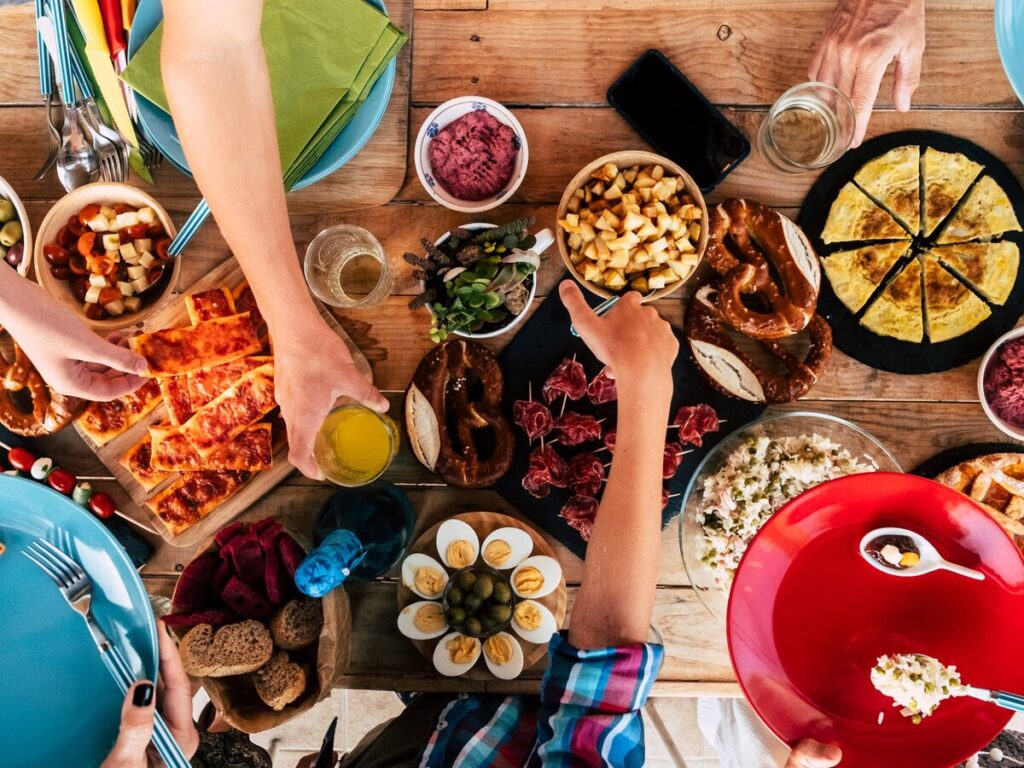
A bountiful table filled with traditional Southern food, uniting friends and family in an atmosphere of comfort, togetherness, and cherished culinary tradition.
Southern families often bond over food, making mealtime a cherished gathering where people can connect and share stories.
Southern Cuisine
Southern cuisine is as rich and diverse as the Southern states, with flavors and traditions that trace back to early European, African, and Native American settlers.
From the emphasis on local ingredients like corn and sweet potatoes to the communal joy of barbecue gatherings, food plays a symbolic and practical role in Southern Hospitality.
- Key Ingredients: Corn, sweet potatoes, collard greens, lard, and butter are staples.
- Barbecue: More than just food, it’s a social event with distinctive styles in each state.
- Regional Dishes: Shrimp and Grits, Fried Green Tomatoes, Gumbo, and Hoppin’ John showcase the region’s agricultural richness and cultural fusion.
In conclusion, food in the South is not just about nourishment; it’s about connection, tradition, and the region’s warmth. Each dish and culinary practice helps define the authentic experience of Southern Hospitality.
For an in-depth exploration of the historical roots of Southern cuisine, please check back – I’ll be posting this article soon!
Southern Hospitality in Modern Times
Tourism and Hospitality Industry
Southern hospitality has had a significant impact on tourism in the American South. From bustling cities to charming small towns, the warmth and welcoming nature of the South have made it a favorite destination for travelers. Let’s explore some of the highlights:

The South’s Best Cities 2023
These cities represent the best of Southern living, each offering a unique blend of culture, cuisine, and charm (source):
- Charleston, SC: Coastal elegance and a burgeoning arts scene.
- Nashville, TN: Music City’s rich musical heritage.
- New Orleans, LA: The Birthplace of Jazz and Mardi Gras celebrations.
- Atlanta, GA: A bustling hub with history, modernity, and the world-renowned Georgia Aquarium.
- Austin, TX: Known for live music, barbecue, and world-class festivals.
The Small Town Charms
The South’s small towns are big on charm, offering a taste of Southern hospitality that’s as rich as a slice of pecan pie (source):
- Beaufort, SC: Historic homes and waterfront views.
- Eureka Springs, AR: Victorian architecture and healing springs.
- Franklin, TN: Historic downtown district filled with preserved gems.
- Amelia Island, FL: Picturesque shoreline with mom-and-pop shops.
- Marble Falls, TX: Five lakes and some of the best wineries in Texas.
The Fastest Growing Cities
Some cities in the South are not just tourist destinations; they’re becoming home to many:
2023 Top Fastest Growing Southern US Cities | ||
| City | Growth | Why People Love It |
|---|---|---|
| Fort Myers, FL | 6.82% | Year-round warm weather and Gulf of Mexico’s crystal blue waters. |
| Cape Coral, FL | 4.19% | Known as the “Waterfront Wonderland” with over 400 miles of canals. |
| Round Rock, TX | 2.80% | Proximity to Austin and high GDP growth. |
| Murfreesboro, TN | 2.72% | Home to Middle Tennessee State and a 30-minute drive from Nashville. |
| Tampa, FL | 0.80% | Gulf Coast beaches and vibrant downtown. |
| Charleston, SC | 0.47% | Beachy vibe and a burgeoning arts scene. |
| Data courtesy of Rocket Mortgage | www.scribblesandgrits.com | ||
The South’s blend of vibrant cities, charming small towns, and rapidly growing communities showcases the region’s diverse appeal. Whether it’s the musical allure of Nashville, the historic charm of Savannah, or the booming growth of cities like Fort Myers, the South offers a rich tapestry of experiences that continue to draw visitors and new residents alike.
Influences on Southern Living and Culture
Publications like Southern Living Magazine focus on celebrating this warm and welcoming culture. The influence of Southern hospitality extends to various aspects of life often featured in the magazine, such as:
- Home Design: Encouraging spacious and welcoming gathering spaces to host family and friends
- Cooking: A strong focus on down-home recipes and comfort food to share with guests
- Entertainment: Emphasis on outdoor living and sharing good times with loved ones
Other Southern Food & Lifestyle Magazines
Food & Lifestyle Magazines
in Southern States
| State | Magazines |
|---|---|
| Texas | Texas Monthly Texas Highways |
| Oklahoma | Edible Tulsa Oklahoma Today |
| Arkansas | Arkansas Living |
| Louisiana | Louisiana Cookin’ Louisiana Life |
| Mississippi | Mississippi Magazine |
| Alabama | Alabama Living Alabama Magazine |
| Georgia | Georgia Magazine Atlanta Magazine |
| Florida | Edible Orlando Florida Travel + Life |
| Tennessee | Tennessee Home & Farm |
| Kentucky | Kentucky Monthly |
| West Virginia | Wonderful West Virginia West Virginia Living |
| Virginia | Virginia Living |
| North Carolina | Taste of the South Our State |
| South Carolina | Charleston Magazine South Carolina Living |
| Data courtesy of www.scribblesandgrits.com | |
Contemporary Challenges
Despite Southern hospitality’s warm and welcoming reputation, the concept faces contemporary challenges, such as the historical legacy of racial inequality and social unrest. Although the modern-day South is known for its friendly disposition, these issues question the inclusivity and extent of hospitality towards all visitors and residents.
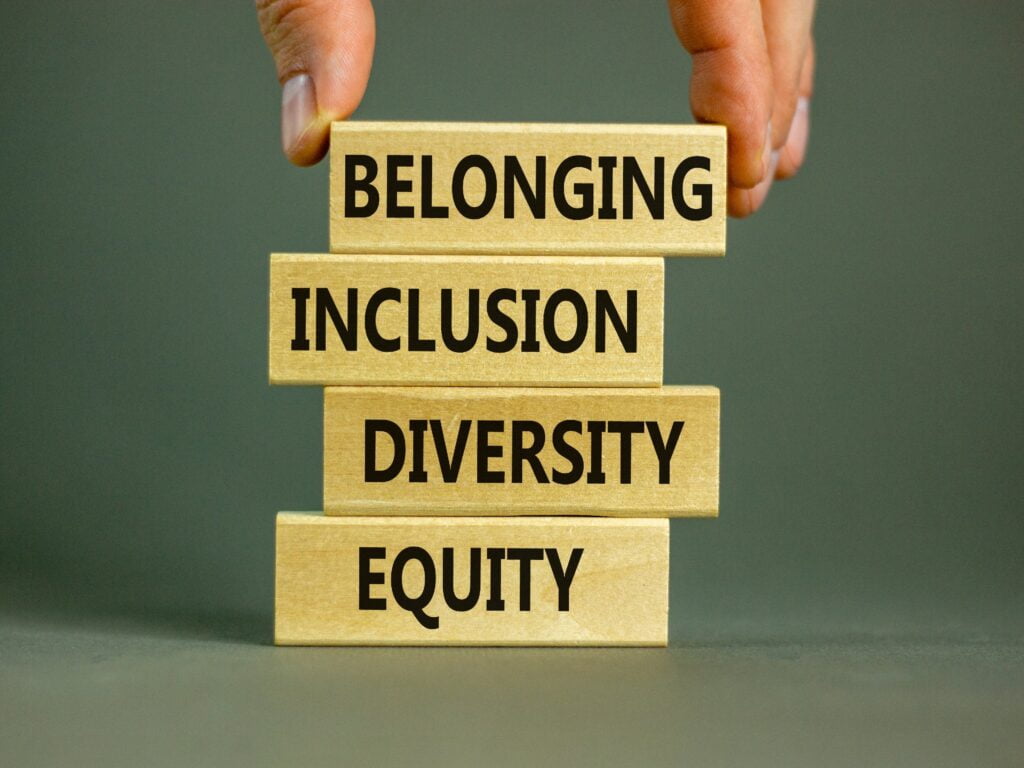
To effectively address these issues, (we) Southerners must work together to ensure that genuine warmth and kindness extends to all who come to the South, regardless of their background or beliefs. By embracing diversity and fostering an atmosphere that reflects Southern hospitality ideals, the South can continue to thrive as a culturally rich and inviting destination for all to enjoy.
The Role of Literature and American Memory
Southern Literature
Southern literature, both fictional and non-fictional, is a significant conduit for portraying Southern hospitality.
These narratives vividly depict Southern life and traditions, contributing to a collective memory of the South in the American consciousness. They preserve memories, challenge perceptions, and prompt readers to re-evaluate their understanding of Southern hospitality.
In essence, Southern literature acts as a mirror and a lens, reflecting the South’s warmth and charm while acknowledging its intricate societal context. It offers a multifaceted understanding of American Southern hospitality, capturing its essence and complexity.
Influential Authors of Southern Literature
- Mark Twain, known for his wit and satire, whose works often depict life in the South during the late 19th century. His most famous works include “The Adventures of Tom Sawyer” and “Adventures of Huckleberry Finn.”
- William Faulkner, a Nobel laureate, whose novels often focus on the Southern U.S., particularly Mississippi. His complex narratives and innovative writing style have made him one of the most studied authors in American literature.
- Harper Lee, whose “To Kill a Mockingbird” is a classic of American literature that explores themes of racial injustice and moral growth in the South during the 1930s.
- Flannery O’Connor, known for her short stories, whose works often explore questions of morality and ethics. Her Southern Gothic style and exploration of the grotesque have made her a significant figure in American literature.
- Eudora Welty, a Pulitzer Prize-winning author, whose works often depict the culture and people of the South. Her detailed descriptions and deep characterizations have made her a beloved figure in Southern literature.
- Zora Neale Hurston, an integral part of the Harlem Renaissance, whose works often depict the lives of African Americans in the South. Her most famous work, “Their Eyes Were Watching God,” is considered a classic of African-American literature.
The authors listed above have used their unique voices and perspectives to weave a rich tapestry of Southern life.
Their works, which range from heartwarming depictions of Southern hospitality to critical examinations of societal issues, continue to influence and inspire readers worldwide.
The Role Of Southern Publishers In Advancing Southern Literature
The University of Georgia Press, a leading publisher in regional and cultural scholarship, has significantly contributed to the advancement of Southern literature. Through their various publications, they have illuminated the experience of Southern hospitality in both fiction and non-fiction works.
University of Georgia Press Published Books
- The Southern Hospitality Myth: This book explores Southern hospitality as a discourse and argues that the myth of Southern hospitality has historically functioned as a way to justify racial and class inequalities.
- Crossroads at Clarksdale: The Black Freedom Struggle in the Mississippi Delta after World War II: This book examines the black freedom struggle in the Mississippi Delta after World War II, focusing on Clarksdale, Mississippi. It explores the role of Southern hospitality in shaping the struggle for civil rights in the region.
- The Southern Foodways Alliance Community Cookbook: This cookbook features recipes from the members of the Southern Foodways Alliance. This group celebrates and documents the diverse food cultures of the American South.
- The New Encyclopedia of Southern Culture: This multi-volume encyclopedia covers various topics related to Southern life and culture, including food, music, literature, religion, and more.
- The Southern Living Community Cookbook: Celebrating Food and Fellowship in the American South: This cookbook features recipes from the readers of Southern Living magazine, along with stories and photographs that celebrate the role of food and fellowship in Southern life.
Other Southern Publishers
- University Press of Mississippi: This press publishes books on various topics related to the American South, including history, literature, and culture.
- NewSouth Books: This Alabama-based independent publisher specializes in books on Southern history and culture and books by Southern authors.
- John F. Blair, Publisher: This North Carolina-based publisher focuses on books about the American South, including history, travel, and memoirs.
- Parkway Publishers: This North Carolina-based publisher specializes in books about the history, literature, culture, travel, and tourism of the southeastern United States.
- Mercer University Press: This Georgia-based publisher focuses on books about the American South, including history, literature, and culture.
Literature is crucial in shaping American memory and informing our understanding of Southern hospitality. The works of diverse Southern authors and the efforts of academic institutions like the University of Georgia Press and other Southern publishers provide valuable insights into this unique cultural phenomenon.
Similarities and Differences with Other Regions
America’s regions and subregions paint a vivid picture of the diverse hospitality landscape across the United States. By recognizing these differences and similarities, we can savor the rich collage of cultural expressions that shape our nation’s unique approach to welcoming and community.
Northeast
New England
- Maine, New Hampshire, Vermont, Massachusetts, Rhode Island, Connecticut
- Formal and Traditional Hospitality
- Cultural Diversity
- Community Engagement
Mid-Atlantic
- New York, New Jersey, Pennsylvania
- Urban Influence on Hospitality
- A blend of Tradition and Modernity
- Civic Participation
Midwest
East North Central
- Wisconsin, Michigan, Illinois, Indiana, Ohio
- Friendly and Down-to-Earth
- Community and Family Values
- Practical and Unpretentious
West North Central
- Minnesota, Iowa, Missouri, North Dakota, South Dakota, Nebraska, Kansas
- Neighborly Connections
- Emphasis on Community Gatherings
- Agricultural Influence on Lifestyle
South
South Atlantic
- Delaware, Maryland, Virginia, West Virginia, North Carolina, South Carolina, Georgia, Florida
- Warmth and Friendliness
- Coastal Influence on Culture
- Historical and Cultural Richness
East South Central
- Kentucky, Tennessee, Alabama, Mississippi
- Southern Charm and Politeness
- Emphasis on Good Manners
- Community Life and Churches
West South Central
- Arkansas, Louisiana, Oklahoma, Texas
- A blend of Southern and Western Traits
- Diverse Cultural Influences
- Strong Sense of Regional Identity
West
Mountain
- Idaho, Montana, Wyoming, Nevada, Utah, Colorado, Arizona, New Mexico
- Casual and Relaxed Hospitality
- Outdoor Community Life
- Connection to Nature and Landscape
Pacific
- Washington, Oregon, California, Alaska, Hawaii
- Innovative and Open
- Coastal and Environmental Awareness
- A blend of Casual and Sophisticated Styles
NOTE
It is important to remember that not all regions of the United States can be generalized entirely. These similarities and differences can vary across states, towns, and communities, with some areas showing more deviation in their cultural practices and values than others.
Other Cultural Influences
As previously mentioned, American Southern hospitality is deeply rooted in regional traditions, including influences from African-American and Native American communities.
The history of Southern cuisine is deeply intertwined with African-American customs, contributing to the prominence of soul food in the region. Enslaved Africans brought cooking techniques, flavors, and ingredients that have become fundamental to Southern cooking.
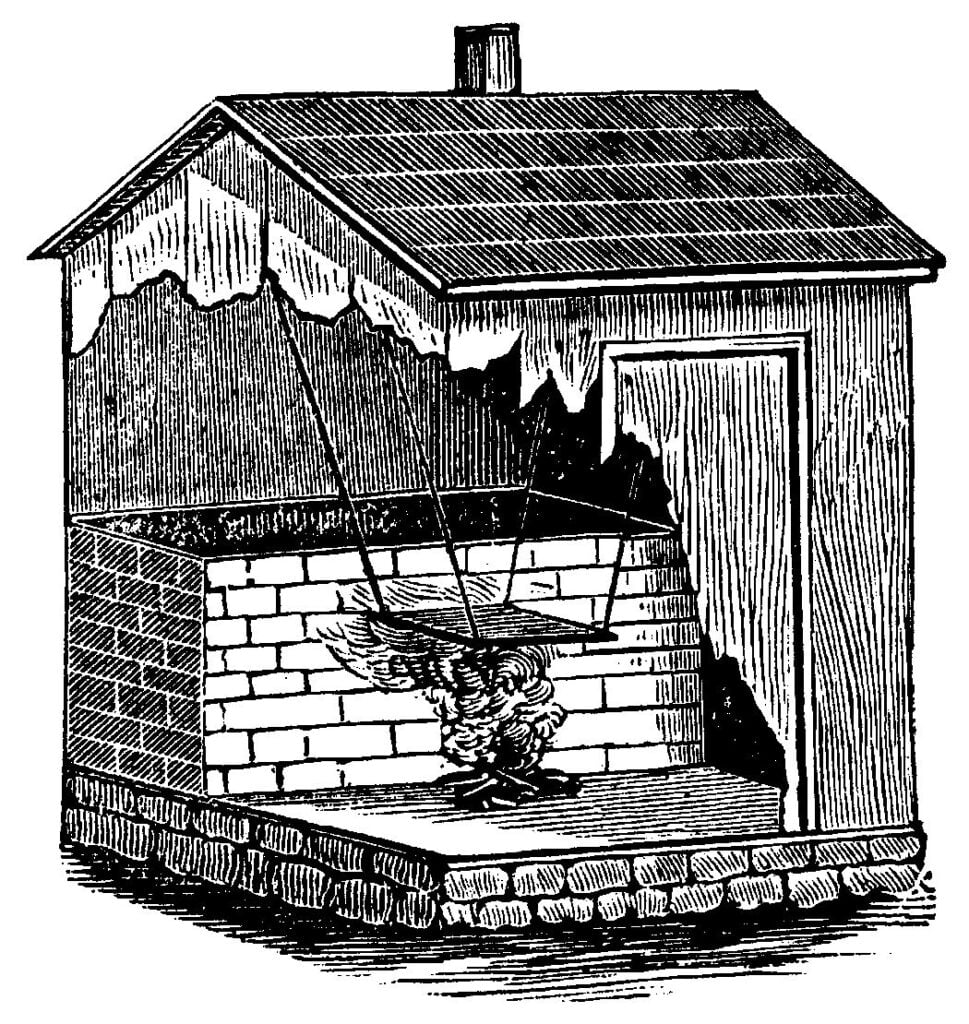
African-American influence extends beyond the kitchen, shaping the very essence of Southern hospitality. The tradition of gathering around the table, sharing stories, and enjoying hearty meals together symbolizes warmth and welcome in the South.
The sketch is of an 1883 Smokehouse. CREDIT: See page for author, Public domain, via Wikimedia Commons
The Native American influence can be seen in the South’s respect for the land and resources. Southerners hold a strong connection to their land and are proud of their rural heritage, contributing to Southern hospitality’s welcoming nature. The respectful relationship with the environment can also be seen in their traditional way of life, such as hunting, fishing, and farming.
Together, these influences weave a complex and beautiful blanket that reflects the multifaceted nature of the South.
Whether it’s the soul-stirring flavors of African-American cuisine or the earthy connection to the land inspired by Native American traditions, the South’s hospitality is a unique blend of cultures, values, and histories.
Your Questions, My Answers
My Final Thoughts
As we wrap up this article, I want to say a heartfelt “thank you” for being here. Exploring the nuances of Southern hospitality has been truly eye-opening, and I hope you’ve felt the same sense of wonder and discovery.
We’ve come together to tackle some tough aspects of our history, and it’s been a crucial part of our growth and learning journey. But you know what? We’re just getting started! A whole world of Southern culture and heritage awaits us to explore and celebrate together.
So, as we move forward, let’s remember those who paved the way and keep their stories alive and thriving. Together, we’ll embrace the richness of Southern heritage, and in everything we do, let’s keep that Southern spirit alive – the warmth, the generosity, and the camaraderie that make Southern hospitality truly special.
Thank you again for being a part of this meaningful experience with me.
Scribble Of The Day: Southern Hospitality Quote
